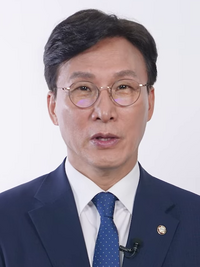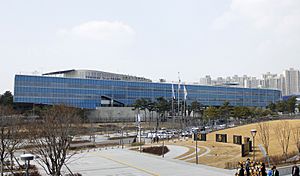Prime Minister of South Korea facts for kids
Quick facts for kids Prime Minister of theRepublic of Korea |
|
|---|---|

Standard of the prime minister
|
|

Emblem of the prime minister
|
|
| Executive branch of the Government of South Korea Prime Minister's Office |
|
| Style |
|
| Member of |
|
| Residence | Chongni Gonggwan |
| Seat | Sejong City |
| Nominator | President |
| Appointer | President (Subject to the National Assembly's approval) |
| Term length | At the president's pleasure |
| Constituting instrument | Constitution of South Korea |
| Precursor | Prime Minister of the Provisional Government of the Republic of Korea |
| Inaugural holder | Lee Beom-seok |
| Formation | 31 July 1948 |
| Deputy | Deputy Prime Minister |
| Salary | ₩191,000,000 annually |
| Website | |
The Prime Minister of the Republic of Korea (Korean: 국무총리) is a very important leader in South Korea. This person is the second-highest political official, right after the President. The President chooses the Prime Minister, but the National Assembly (which is like the country's parliament) must agree.
Unlike in some other countries where the Prime Minister is the main leader, in South Korea, the President is both the head of state (the country's official representative) and the head of government (the one who runs the government). The Prime Minister helps the President a lot and is the first person to take over if the President cannot do their job. This is similar to how a Vice President works in the United States.
The current Prime Minister is Kim Min-seok. He started his job on July 3, 2025, after being chosen by President Lee Jae Myung. Before him, Han Duck-soo was Prime Minister. After some events, another leader, Choi, briefly served as acting Prime Minister before Han Duck-soo was reinstated.
Contents
What the Title Means
The Korean words for Prime Minister are gungmu chongni (국무총리; 國務總理). The word gungmu means "state affairs" (things related to running the country). The word chongni means "prime minister" or "premier." So, the full title means "Prime Minister for State Affairs." However, in English, it's simply called "Prime Minister."
A Brief History of the Role
The job of Prime Minister was created on July 31, 1948, just before the South Korean government officially began. Lee Beom-seok was the first person to hold this position.
For a short time, from 1961 to 1963, the title was "Chief Cabinet Minister." In 2015, Lee Wan-koo became Prime Minister but later resigned due to some issues.
What the Prime Minister Does
The Prime Minister is the President's main helper. They work closely with the President to run the country. The Prime Minister is also the second-in-command in the State Council of South Korea, which is like the President's main team of advisors and ministers.
The Prime Minister helps the President by:
- Watching over different government ministries.
- Suggesting people to become ministers.
- Helping to lead the Cabinet meetings.
If the President cannot do their job, the Prime Minister steps in as the acting President. For example, Han Duck-soo served as acting President when Yoon Suk Yeol was temporarily unable to perform his duties.
Sometimes, a person is called an "acting prime minister" if they have been chosen but not yet officially approved by the National Assembly. This term can also be used if a Prime Minister has resigned but is still working until a new one is appointed.
The Prime Minister also has two deputy prime ministers who help them. One of these deputies can take over if the Prime Minister is unable to work.
How a Prime Minister Can Be Removed
The rules for removing a Prime Minister are in the Constitution of South Korea. If the Prime Minister (or other government officials) breaks the Constitution or other laws while doing their job, the National Assembly can start a process to remove them.
First, at least one-third of the National Assembly members must suggest the removal. Then, more than half of the members must agree to it. If this happens, the Prime Minister is immediately stopped from doing their job.
The final decision is made by the Constitutional Court of Korea. This court must make a decision within 180 days. If the Prime Minister leaves office before the court makes a decision, the case is usually closed.
For example, in Han Duck-soo's case, the Constitutional Court decided to dismiss the case. This meant he was able to return to his job as Prime Minister.
The Prime Minister's Office
The Prime Minister's Office helps the Prime Minister do their job. It has two main parts: the Office for Government Policy Coordination and the Prime Minister's Secretariat.
The Office for Government Policy Coordination helps the Prime Minister with:
- Managing and overseeing different government departments.
- Planning important national policies.
- Looking into problems and conflicts in society.
- Making government rules better.
The Prime Minister's Secretariat helps the Prime Minister with:
- Working with the National Assembly.
- Giving advice on important country matters.
- Handling information about what's happening in South Korea and around the world.
- Helping citizens with their complaints.
- Supporting the Prime Minister's activities.
- Managing the Prime Minister's official residence.
Salary and Home
The Prime Minister earns about US$163,000 each year. After they leave office, former prime ministers receive a pension for the rest of their lives.
The official home for the Prime Minister is called Chongni Gonggwan. The South Korean government owns and takes care of this residence. It has been the Prime Minister's home since the early 1990s.
After Being Prime Minister
All former prime ministers receive a lifelong pension. They also get protection from the Presidential Security Service, though they can choose not to accept it. When a former prime minister passes away, they usually have a state funeral. This allows the public and government officials to show their respect.
Timeline of Prime Ministers
See also
 In Spanish: Primer ministro de Corea del Sur para niños
In Spanish: Primer ministro de Corea del Sur para niños
- Politics of South Korea
- Premier of North Korea
- Prime Minister of the Korean Empire
- Vice President of South Korea
 | James Van Der Zee |
 | Alma Thomas |
 | Ellis Wilson |
 | Margaret Taylor-Burroughs |



